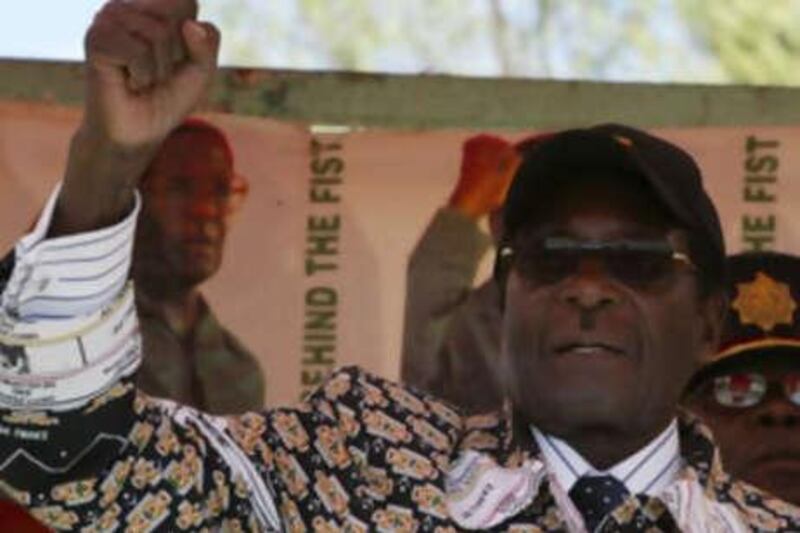HARARE // It is Robert Mugabe's good luck, and his country's citizens' own misfortune, that Zimbabweans are known as some of the nicest people in Africa. Erudite, educated and equable, they have a seemingly limitless capacity to endure the consequences of their president's misrule. It is not that they do not want change - the victory of Morgan Tsvangirai, the opposition leader, in the first round of the presidential election in March demonstrates that desire - rather, they will not take to the streets in protest, and even now crime rates are far lower than in neighbouring, democratic South Africa.
"At Lancaster they were advocating for one man, one vote, but now when we vote they kill us," said Isheunesu Mhindu, chairman of the opposition Movement for Democratic Change in ward one of Harare South constituency. Mr Mhindu was referring to the Lancaster House agreement in 1979 that ended the war between Ian Smith's regime and guerrillas seeking majority rule. His house, along with seven others, was destroyed by Zanu-PF thugs this week, leaving more than 30 people homeless in the area as the organisational descendants of those guerrillas sought to ensure their own minority rule continued.
"If other countries don't intervene we leave it to God because people have spoken but it doesn't change anything," he said. "As it is, people are dying of hunger, no medication, schoolchildren are collapsing at the school because they have eaten nothing since morning. We don't have anything to eat, we haven't even bathed because we have no soap." It is the second time Mr Mhindu, 49, has lost his home to the ruling party's militants - his house and timber merchant business were destroyed in Mr Mugabe's murambatsvina, or "clean out the trash" operation a few years ago, which left hundreds of thousands homeless.
But he will carry on as best he can. "People are peace loving," he said. "I think it's because of the Christendom which was introduced here. Had it not been so, in normal circumstances you can't endure such circumstances." Benjamin Kayesu, 25, was beaten by a gang of Zanu-PF militants, including armed and uniformed members of a police paramilitary support unit, high on victory and power after Mr Mugabe's "re-election" in a one-candidate vote last Friday.
"I feel great pain," he said, sitting on the ground in a field near the capital. "I don't know what to do now because of the anger that I feel. There's nothing I can do to them because they are the ones that have guns and I don't have guns." "I will stay in my house until I die there. I don't have anywhere to go because my parents are dead. If they want to kill me, they can come and kill me any time."
It is this acceptance of events that is extraordinary. In the long term, it is Zimbabwe's best hope of avoiding becoming another violence-wracked African basket-case like the Democratic Republic of Congo, but in the short term it is also one of the factors keeping Mr Mugabe in power. In contrast, the violent reaction to a stolen election in Kenya in December prompted negotiations between the two sides and a deal to share power, with real concessions made by the government.
Another factor keeping Mr Mugabe in place is the diaspora. The typical Zimbabwean characteristics make the millions of Zimbabweans who have moved away in search of a better life popular among employers elsewhere, and the remittances they send home sustain millions of people - as well as removing potential troublemakers from the country. As Harare returned to what passes for normality in Zimbabwe - galloping hyperinflation, empty shop shelves, police demanding bribes at checkpoints - another of Mr Mugabe's victims prepared to join the exodus.
Japhet Kenneth, an MDC activist who was abducted and beaten and saw a colleague killed in front of him, said he was leaving for South Africa - even though Zimbabweans there were the targets of xenophobic riots in May. "I have to go, I don't think I will be able to stay here," said Mr Kenneth, a qualified but unemployed graphic designer. "I'm wanted whether dead or alive so I have no option." He has not returned to his home in Seke, south of the capital, since the attack last month and he and six other members of his family did not vote, singling them out for retribution, he believes. "Now the police are everywhere," he said, looking around.
"Zanu-PF is not the majority, it is just the people with the weapons and the power. "We feel we can't do anything. Truly I regret being born a Zimbabwean." * The National





